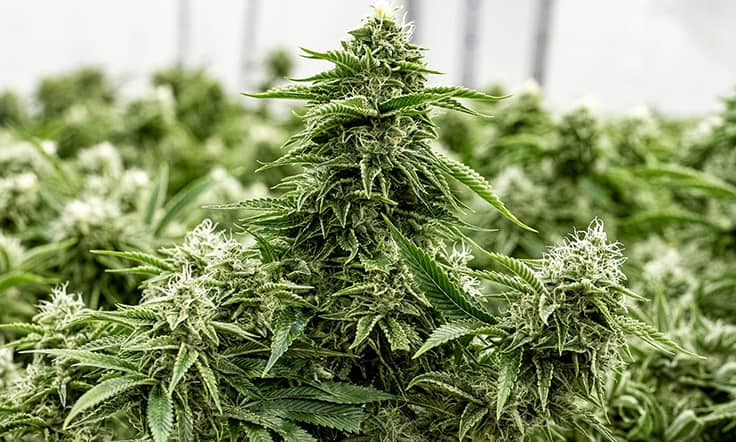Virginia Gov. Ralph Northam has unveiled plans to introduce an adult-use cannabis legalization bill when the General Assembly reconvenes in January, following the release of a study on the potential impacts of legalization in the state, and the Virginia Medical Cannabis Coalition (VMCC) hopes that the state builds on its existing medical program when planning the launch of an adult-use market.
VMCC is a coalition of vertically integrated cannabis operators that had won conditional approval from the Virginia Board of Pharmacy with the goal of advancing the medical market through patient education and connecting the state’s industry stakeholders with legislators, according to Jack Page, VMCC member and the founder and CEO of medical cannabis operator Dharma Pharmaceuticals.
Dharma opened for business Oct. 17, marking the first day of medical cannabis sales in Virginia. From his experience in the medical market, Page says the state has a lot to consider when it comes to legalizing and regulating adult-use cannabis, as well as fine-tuning the medical program.

Photos courtesy of Dharma Pharmaceuticals
Virginia law requires medical cannabis operators to be vertically integrated, and Dharma currently operates one location that houses its cultivation, processing and retail operations. Page says patient response has been positive in the month or so since the market launched, and in January, Dharma will be able to open up to five additional retail locations within its health service area.
Page and the VMCC support adult-use legalization, but want to ensure that the medical program remains part of the overall cannabis industry in Virginia, and that changes are made to the medical program to make it more accessible to patients.
For example, although Dharma can deliver to its patients, the current medical regulations mandate that a patient’s first visit to the dispensary be on-site.
“We’ve been contacted by numerous hospice organizations and nursing homes across the state that have patients that could benefit from the medicine but are not physically able to travel,” Page says. “So, that’s one of the things that we need to look at fixing in the medical program.”
Another change the VMCC has been lobbying for is access to flower in Virginia’s medical market. Right now, it is an extract-only market, which increases costs for both patients and operators.
“That is a dose form that a lot of patients are asking for, and there are certain conditions that botanicals just treat better and the cost is lower to patients because there’s not all the processing with the expensive lab equipment that we have in the back to extract the oil, refine the oil and make the product,” Page says. “Right now, we’re vertically integrated, and that’s a barrier of entry to most people because the cost associated with a vertical organization is pretty high. We’d like to see some way for small business to be included in the adult-use market, as well.”

Virginia has an extract-only medical cannabis market, but Page says allowing patients to access flower would decrease costs for both operators and patients.
Although the medical program still has its pain points, Page would like the opportunity for Virginia’s medical cannabis operators to roll out the adult-use program to ensure a speedy market launch.
“Allowing the medical producers to jumpstart the adult-use market, you’re providing tax revenue pretty much immediately for the commonwealth, and that can pay for some social equity programs and pay for the infrastructure that will be required, and of course provide those jobs faster if we’re able to join the market as early as possible,” he says.
However, Page is still keeping his main focus on the state’s patient base.
“We definitely want to make sure that we also continue to serve our medical patients first and foremost,” Page says. “We want to make sure, too, that any kind of adult-use market has the same testing requirements so that we ensure that the product that’s being delivered is safe for Virginians to use.”
Virginia’s medical cannabis operators are required to submit their products for third-party testing for pesticides, heavy metals and mycotoxins.
“The thing, too, is with the medical cannabis market, there are more specialized dose forms that are used to treat specialized conditions, so that’s why it’s important to keep the medical market also viable in Virginia,” Page says. “For example, Dharma is producing a nasal spray and a suppository. You’re not probably going to find those kinds of products in an adult-use market, but we are seeing there’s a high demand for those products in the medical market.”
VMCC is advocating for one regulator that would oversee the medical and adult-use cannabis programs in Virginia, he adds, as well as the ability for medical operators to co-locate adult-use dispensaries with their medical storefronts.
“I just think in the discussions of bringing adult-use to Virginia, we need to realize that the medical program and the adult-use program are both necessary to serve patients across the commonwealth,” Page says. “We have to carefully think about how the adult-use market needs to be rolled out so that we don’t make all of the time and effort that’s been put into establishing the medical program be wasted.”




